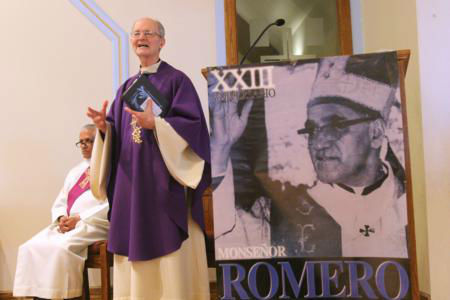Archbishop inspired Salvadorans to believe in themselves, says priest
WYANDANCH, N.Y. (CNS) -- Salvadoran Archbishop Oscar Romero was remembered at a Mass celebrated March 22 at a Long Island church by a priest who has traveled to El Salvador on more than a dozen occasions to carry on the slain archbishop's advocacy for the poor and the oppressed.
Father William Brisotti, pastor of Our Lady of the Miraculous Medal Parish in Diocese of Rockville Centre, celebrated a Spanish-language liturgy on the Fifth Sunday of Lent, marking the 35th anniversary of the assassination of Archbishop Romero.
The prelate was fatally shot March 24, 1980, as he celebrated Mass in the chapel of a cancer hospital where he resided in San Salvador.
Latino worshippers, the majority of whom Father Brisotti identified as immigrants from El Salvador, filled the pews and vestibule of the tiny church for the anniversary Mass. A Salvadoran folk group strummed guitars and sang "peasant" songs passed down from previous generations.
"People here care for (Archbishop Romero) very much," said Father Brisotti.
Located in one of the poorest communities on Long Island, Miraculous Medal Parish is multicultural, with two-thirds of its parishioners coming from 15 Latin American countries, Father Brisotti said. Of that group, immigrants from El Salvador and the Dominican Republic outnumber the others.
"There's a spirit here," Father Brisotti said. "People feel at home here. Everyone is welcome."
A dedicated social justice and anti-war advocate, the 72-year-old priest maintains a strong devotion to Archbishop Romero, who defended the rights of the poor during a bloody civil war that tore apart El Salvador.
Father Brisotti frequently incorporates passages from the Archbishop Romero's homilies into his own preaching, as he did during the anniversary Mass.
Quoting a sermon that Archbishop Romero had preached two weeks before his death, Father Brisotti proclaimed: "The great need today is for Christians who are active and critical, who don't accept situations without analyzing them inwardly and deeply. We no longer want masses of people like those who have been trifled with for so long.
"We want persons like fruitful fig trees, who say 'yes' to justice and no to 'injustice' and can make use of the precious gift of life, despite the circumstances."
It was words such as these, Father Brisotti told Catholic News Service in an interview after the Mass, that "inspired the people of El Salvador to believe in themselves."
"It's a tiny country that was under the influence of militarism for decades," he added. "(Archbishop) Romero was a person who impacted people's lives. He taught them to believe in themselves, to believe in what they can do to build a better society."
Father Brisotti, who did mission work in Chile and Peru for three summers in the 1960s while studying for the priesthood, said he started following Archbishop Romero's growing legacy in the '70s. A Salvadoran priest who served in Father Brisotti's parish on Long Island and had previously worked with Archbishop Romero in San Miguel, El Salvador, and shared stories about the archbishop's activism.
"I was really getting imbued with (Archbishop) Romero and his work for justice in El Salvador, never thinking I would be going there," Father Brisotti said.
The priest, who never met Archbishop Romero but was greatly inspired by his work, traveled to El Salvador more than a dozen times between 1982 and 2001. Upset by the archbishop's assassination in 1980 and the rape and killings of four U.S. churchwomen in that country later that year, Father Brisotti was determined to go to El Salvador to see for himself "what was going on."
During his first trip in 1982, Father Brisotti and three fellow members of the Catholic Peace Fellowship, an anti-war group, met with Deane Hinton, U.S. ambassador to El Salvador at the time, to advocate for the elimination of military aid to the Salvadoran government.
While in the country, Father Brisotti had the opportunity to celebrate Mass at San Salvador's Metropolitan Cathedral of the Holy Savior, where Archbishop Romero is entombed. "An amazing experience," he recalled.
Among his subsequent trips to the country was a five-month visit, from November 1984 until March 1985, when he worked at a refugee camp for people displaced from the conflict zones.
In 1988, Father Brisotti returned to the country with an international group tasked with defending the rights of 150 wounded rebels granted asylum in the San Salvador cathedral. During the week that he was there, Father Brisotti slept on a mat at the foot of Archbishop Romero's tomb, near a huge portrait of the prelate. "It gives me goose bumps just remembering it," he said.
Father Brisotti's last visit to El Salvador was in February 2001, a few weeks after an earthquake rocked the country, killing some 1,000 people. While delivering $15,000 that his parish had raised for the purpose of replacing roofs on homes, another quake shook the nation. Though unnerved by the event, Father Brisotti managed to complete his humanitarian mission.
In February, Pope Francis, the church's first Latin American pontiff, signed the decree recognizing Archbishop Romero as a martyr, a person killed "in hatred of the faith." The decree means there is no need to prove a miracle usually required for beatification, which will take place in San Salvador May 23.
While he thinks it's "wonderful" that Archbishop Romero's sainthood cause is accelerating, Father Brisotti views the canonization process as a "technicality."
"The concept of miracles is physical healings," said Father Brisotti. "What about the concept of bringing hope to people without hope, inspiring a nation to believe in itself? Isn't that a miracle? Jesus called Lazarus out of the tomb. (Archbishop) Romero called people back to life. ... The people already knew that Archbishop Romero is a martyr and is already a saint."



















